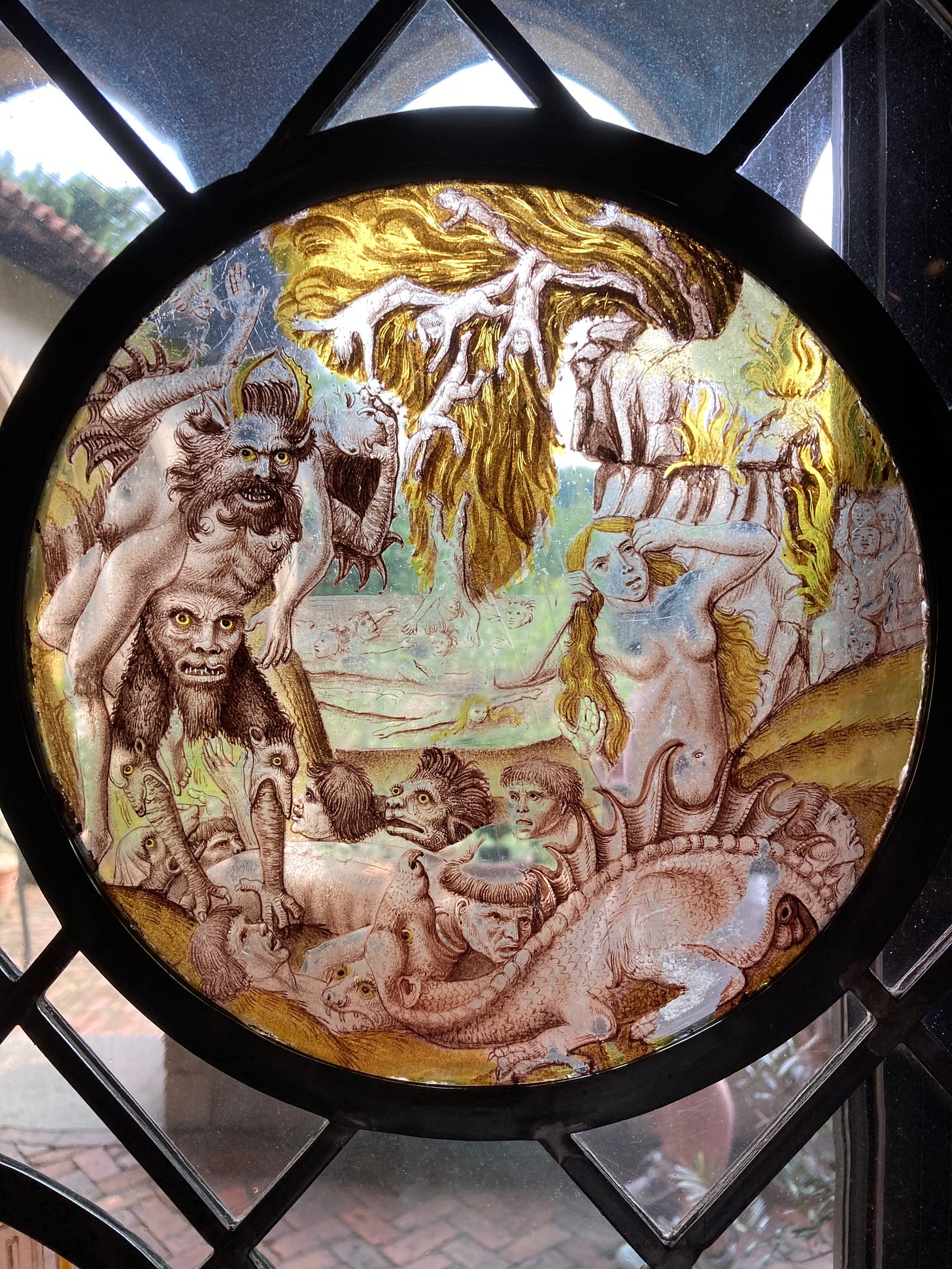on Red Scare, our humorless age, and the Decadent/[Dimes] Trad Horseshoe
if you’re interested in preordering a copy of cracks in pomo: the zine or in making a financial contribution, email stephenadubato at gmail dot com; if you’re in the NYC area, join our launch event on 7/28 at the Catholic Worker Maryhouse

Disclaimer: I’ve been asked repeatedly to clarify my position on all things pagan/decadent/dirtbag/Dimes related. But first keep in mind, my “position” doesn’t actually matter. Only God’s opinion matters on this blog. But out of charity, I compiled the arguments I’ve made from several of my past articles (many of them cited below) and consolidated them into one piece. Beware that this post is extremely disorganized and the line of argument is far from linear…like most things postmodern. Deal with it (with charity, of course).
The Age of the Decadent Prophet
God has been known to send prophets when a given people lose their way or fall into chaos. When the nature of chaos is overt immorality and blasphemy, he’ll usually send a “righteous” ascetic prophet along the lines of a John the Baptist or an Isaiah. When it’s highly moralistic, humorless, or aesthetically drab, he’ll send (I’m using this term generously and not literally) a “decadent” prophet.
Think Oscar Wilde, Camille Paglia, Quentin Crisp, Andy Warhol, JK Huysmans, whose irreverence and amorality holds up a mirror to the uptight, self-righteous masses, who have forgotten that “God alone is good,” and that their own efforts will never be enough to make themselves or society “good.” We are all selfish and immoral in plenty of ways. And though we should strive every day to be more selfless, we will never totally measure up (see my piece on The Case for Bad Catholics). We will surely face consequences for our moral failure, but at the end of the day it’s God who is in control, and who is capable of cleaning up our messes (IF we allow him to).
Before continuing, a note on the paradoxical morality of camp. The camp sensibility of the aforementioned decadents is able to highlight truth obliquely through their use of irony, which often tends to be much more effective than the direct and unironic approaches of reactionaries (see my pieces on the camp sensibility of Andy Warhol and of Pope Benedict XVI). Pope Benedict (who Fabio Cleto dares to call the first camp Pope) warns in the Introduction to Christianity of the follies of speaking truth without any tinge of ironic detachment. He likens such figures to the clown in one of Kierkegaard’s stories who attempts to warn the townspeople that their village is burning down, only for them to think it’s all a part of his nonsensical act.
Our Humorless Age
We may here think of Jordan B. Peterson attempting earnestly–yet in vain–to convince Slavoj Zizek of the logical coherence of his worldview. Zizek continues to mock him saying, “can’t you see? I’m trying to elicit from you a joke.” Though less rational on paper, aesthetically speaking, Zizek emerged as the winner of the debate. His wild sense of humor was more resonant than any of mopey, soyboy Peterson’s “arguments.” Peterson came off just as cloying and obnoxious as the proponents of wokeness who he opposes so strongly. It was the Marxist atheist whose argument opened a greater space for Truth, for God to emerge, as his sense of humor grapples with and accepts human fallibility and the need for transcendence better than any of Peterson’s [Jungian] theistic arguments. Because we are irrational and incoherent, we must be able to laugh at ourselves, trusting that God’s “coherence” fills in our pitfalls.
The decadents’ exaltation of artifice indirectly celebrates that there is indeed an intrinsic order to Nature. Their toying with sin and the diabolical affirms that there is such a thing as sanctity and the Sacred. Yes, it’s risky. And at times, it can be downright irresponsible. But in moments when liberal pieties like the naïve trust in self-sufficiency, the benevolence of the human will, and bourgeois respectability reign supreme, sometimes it takes pagan revelry and debauchery to shatter the complacency found in the false certainties of Enlightenment rationalism (think De Sade)…and leave us to watch it all burn or to implore the intervention of the transcendent Creator.
Now, there are indeed a handful of figures throughout history who have managed to create a synthesis between the ironic humor and sincere reverence for the sacred…toying with irrationality while not indulging in pure nihilism or narcissistic apathy. Think of figures like GK Chesterton, or the lesser known Lorenzo Albacete, with their larger than life sense of humor and willingness to poke fun at themselves combined with a deep commitment to God and seriousness about “ultimate things.” Only Wilde came closest to Chesterton’s ability to play with paradox–though (as Chesterton wrote in a brilliant essay on the triumphs and errors of Wilde) he was too flippant about artifice and the unnatural, toying flagrantly with irreverence…but at least he found his way back to God before dying.
The Pagan/Occultic-Cath Horseshoe
Huysmans took a similar route to God “through the back door” of Satanism. And it was precisely because he chose to experiment with actual Satanism rather than (like Wilde and the other aesthetes) with milder forms of Classical paganism that he recognized more immediately than Wilde the dangers of camp and rerouted to the Sacred. But at the end of the day, better Satan than liberal benevolence–which is to say “nothing.” “Let your no mean no”: at least Satanism is so wrong that you can see more clearly your need for what’s true.
This is why you’re much more likely to find Jesus reading Camille Paglia than Fr. James Martin SJ or Bishop Robert Barron. It’s also for this reason that I personally find myself drawn to forms of art that allude to either the sacred or the occult. Byzantine chant or Bad Bunny, Elite or The Gospel According to Matthew (Pasolini edition), but please, not Bridgerton or Taylor Swift. (*no, I don’t endorse the glorification of Satan…but I do endorse the aesthetic quality and profound themes often present in art made by pagans and occultists). The truly diabolical ones are not so much the ones that are openly glorify the occult, but the ones who glorify the occult while claiming to be neutral, benevolent, or morally good. If you’re going to exalt lies, at least tell the truth about it…
#CringeCaths and the Irony Pill
But in the realm of orthodox Christianity (and monotheism more broadly), we are currently facing a drought. Devotees of the Sacred have absorbed the kitschy sincerity and self-seriousness of the liberal mainstream and their copycat reactionaries. There are no devout people who are genuinely funny or ironic anymore. The only options for those with orthodox beliefs are cloying earnestness, affected pandering—being “cringe” for lack of a better term. The liberal WASP bourgeois sensibility has infiltrated the temple.
In come the dirtbag leftists and trad Catholics of Dimes Square, and their ring leaders, the hosts of the Red Scare podcast. You can start by reading my first commentary on RS in AmCon back in January 2022 (which Megyn Kelly referenced in her interview with the girls in June 22). Before making my (measured) defense of Red Scare and their ilk, I’ll put out some of my initial criticisms:
-For the trads of Dimes Square (and perhaps to an extent for Dasha…though over time her convictions seem to be maturing), Catholicism is a subversive LARP. It’s a way to own the libs. But Christianity is not a toy nor is it a tool to provoke one’s political opponents. It is the event of God coming down to earth, making himself present in the everyday lives of human beings, and calling those he encounters to live lives of love for and communion with their neighbor, to the point of dying for them. The object of Christianity is charity, mercy, self-gift, generativity. Not ironic performance art.
-The sedevacantist bent of this crowd testifies to their lack of seriousness toward the ideals of communion and charity. Yes, Pope Francis can be cringe. But your personal opinion shouldn’t trump the fact that the Holy Spirit chose this broken human to be our spiritual father and guarantor of the communion of the Christian community on earth and our link to God in heaven.
-Their extreme form of irony and performance art risk being overly apathetic, nihilistic, and socially irresponsible–again, demonstrating a lack of charity for the concrete needs of one’s neighbor. Further, there is (as Tara Isabella Burton points out) an undeniably pagan reduction to their aesthetic, ideological version of Christianity evidenced by their affinities for Nietzsche and the Bronze Age Pervert.
That being said, their (twisted) engagement with Catholicism highlights certain un(der)explored insights about the Faith that devout (i.e. cringe, unironic) Catholics ought to be taking very seriously. It brings Catholic discourse and imagery into dialogue with subcultures that it has yet to reach in a meaningful way, thus generating a series of paradoxical syntheses or “horseshoes”: Catholicism and socialism, queer culture, the arts scene (BPD art heauxs), etc. (I further flesh out this point in my articles on the topic in the National Catholic Register, National Catholic Reporter [yes, both of them], and Catholic World Report.)
The Path of Neo-paganism
In response to the neopagan accusations, I stand by my point about Paglia and the other decadent aesthetes and camp icons. While they may not have the answers, they are asking the right questions…which isn’t to say much for respectable neolibs. Their amorality, decadence, and self-indulgence is an antidote to bourgeois sincerity and genteel moralism. It reminds us that the soul is tainted by sin, and cannot be saved by good intentions.
Provided one is mature enough not to fully immerse himself in it, he can use it as a tool to break through the stultifying conditions of our current discourse–which American Catholics have fallen prey to. We’ve become cringe. We carry ourselves like WASPs, forgetting the ethnic flare…the spiciness of our immigrant ancestors (addressed in Paglia’s 1994 interview with Fr. James Martin and the TLM episode on Red Scare with Mecha). It cracks through our fear of contingency and forces us to reckon with the dark forces that are an ineradicable part of our human nature–forces that that Nietzsche and Freud weren’t afraid to confront, and which your humanities professors and psychologists don’t want you to know about. We can then either become beholden to the darkness, or choose to seek out the light. (On that note, I was quoted in a National Catholic Register article about how the draw of New Age spirituality and occultism among Zoomers is a sign of their disillusion with bourgeois secularism and the neoliberal paradigm…a phenomenon which in a way echoes much of what was going on with Huysmans’ lot at the “fin de siècle”).
In my own experience, I’ve come to see how the neopagan bent associated with the Dimes crowd (and decadence more broadly) served as a temporary but necessary step toward deeper maturity in my spiritual life. Getting hooked on RS brought out a lot of my nasty, immature, “decadent” tendencies. But the fact that they were amplified forced me to actually have to confront them. At the same time, their engagement with neopagan bootstrapping, responsibility-pilled discourse (a la Nietzsche, Freud, Jung, Lasch, and to a lesser extent BAP, Tate, and Peterson) made me come face to face with and deal with my resentment, narcissism (the Ocasio Crytez episode played a crucial role in this), repressed emotions, and gender related conflicts (look out for my essay coming out in Hedgehog review on this topic). No, neopagan self-help cannot “save” me or bring me true happiness. Only Jesus and the communion of the Church can. But I can’t say it didn’t help me to articulate more concretely the specific ways I’m in need of salvation.
Nihilism: A Door to Sincerity (or Satan)?
In response to accusations about promoting nihilism, I’ll reference my post about Matty Healy in UnHerd:
The ironic detachment associated with basedness requires humility and a form of self-abnegation — I must reach a point when I realize that I’m not the source of meaning in the universe and that my sincerity will not, in fact, solve the world’s problems. Without doubt this can develop into a form of nihilism (which at least doesn’t mask itself as something other than what it really is–like being cringe does). But it can also lead, as Healy’s comments demonstrate, to rediscovering what actually matters most in life: “dealing with how my mum’s feeling” and “trying to be in service to people”, rather than losing yourself in internet squabbles.
Healy’s comments here echo a recurring point that Red Scare co-host Anna Khachiyan makes about the “forgotten” virtues of being a loyal friend, having and raising children, and investing time in religion and community, which “cringe progressives who have no skin in the game” don’t understand.
Following the cues of Ecclesiastes, the negation of the meaning of things can lead one down the via negativa, taking the apophatic route toward truth and the real meaning of things. Again, this turn–without sincere faith in God and an intentional community–can lead to straight up nihilism.
I think of Catholic youth groups who who try to be “cool” and “hipster.” They fail precisely because they are trying so hard to be cool. I suggest they watch Dasha’s viral “Sailor Socialism” video in order to learn how to stop trying so hard. Dasha’s affect exudes pure “no fucks given” and “fazed by nothing.” Her extremist apathy can be, once again, a door to either extreme nihilism and misanthropy, or intense devotion to that which is most true. If you listen to the Red Scare episodes released over the last year, you’ll see the she is currently discerning which door to enter.
In this regard, phenomena like Red Scare and the broader dirtbag scene have an effect on people that can be likened to that of the “yellow book” (Huysmans’ Against Nature) on Wilde’s fictional Dorian Gray. The book “corrupted” Dorian, opening him to a brand of aestheticism that became intensely self-indulgent and lead him to become misanthropic to the point of committing homicide. And yet, his extreme acts of evil opened him to recognizing his need for God and salvation in a way that bourgeois Victorian morality would never had made possible. Both Wilde and Huysmans paths toward Catholicism follow this trajectory.
I don’t want to trivialize the extent to which extreme aestheticism can lead to fascistic forms of domination (see Burton’s writings on the relationship between Mussonlini’s aesthetic and his political discourse in her new book Self-Made) and diabolical violence. But as they say, know one knows God better than the devil…especially not bourgeois liberal humanists. Once acknowledging the existence of and need for God (which a true Satanist must), the question is, will we choose to submit to Him or reject Him?
The Last Laugh
Lastly, and most importantly, Red Scare is hilarious. Their irreverent humor, their willingness to say things that we are all secretly thinking but too respectable to say makes them extremely entertaining to listen to. In a sea of self-serious, self-righteous, and unoriginal prudes, their iconoclastic jokes make one want to actually enjoy life, rather than calculating how to signal their moral virtue to the faceless masses. They give us permission to laugh and not take ourselves too seriously, in a culture where offensive jokes are a mortal sin, and acknowledging that we are not actually moral–and that we’re all actually dirtbags, both literally (Ecclesiastes 3:20) and figuratively–is anathema.
They give us permission to publicly acknowledge that liberal pieties have no substantial value. And that sometimes being irresponsible can open the door to taking up one’s actual responsibilities. They spice things up by throwing a wrench into the discourse, thereby provoking very important conversations that need to be had. Like Trump and Milo Yiannopoulos, they may be guilty of many moral errors. But you can’t accuse them of not being funny. And in this day and age, that’s not exactly a small deal. The arch-contrarian, the troll, may be self-indulgent, but in the least she is original…she dares the shake up the complacency and conformity of the masses. Even if her actions are immoral and her conclusions false, at least she has provoked the public to begin questioning the things they take for granted to be true.
I explore how self-deprecating, “amoral” humor can lead one to take themselves more seriously and become more moral in an authentic way in my review of Sean Thor Conroe’s novel Fuccboi. Conroe is part of the “alt-literature” movement spurred forward by Giancarlo DiTrappano. The movement’s sensibility overlaps much with the dirtbag, Dimes Square scene. (Conroe has appeared on Red Scare, and alt-lit events have been hosted in Dimes). Conroe’s takes a Wildean approach to humorless, self-righteous college educated “white boys.” His novel was in part a masterful exercise in trolling, as he predicted that it would incense such a demographic to write up critiques condemning his lack of moral responsibility and narcissism—said screeds ultimately holding up a mirror to their own amorality and narcissism. Jordan Castro (who has appeared on both my own podcast and on Red Scare) emerges as a prime example of how the ironic brand of humor associated with the alt-lit scene can lead someone down the path toward unironic faith. His work testifies to how one can have sincere faith in Jesus without becoming cringe or reactionary.
So what it all comes down to is this: listen to Red Scare with caution, but by all means, please actually listen. Until God sends us another Chesterton, another Albacete, I’ll take what I can get.
$upport CracksInPomo by choosing a paid subscription of this page, or by offering a donation through Anchor. Check out my podcast on Anchor and YouTube and follow me on Instagram and Twitter.
photo taken at the Cloisters.












